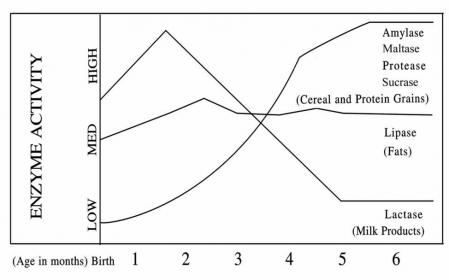[QUOTE=JB;7602820]
The new issue of The Horse just came out, and has a really nice article on young horse development. It talks about not just the fact that foals can’t digest (which is not the same as can’t eat) forages and grains, but why. Their intestines develop at a very rapid rate early on - they simply don’t have what it takes in the first few months. Literally. As the length of the intestines develops, so does the colony of bacteria necessary to digest these things.[/QUOTE]
If that is the article posted by Dawn it says that foals digestive track changes with age to accommodate cellulose and complex carbohydrates. It doesn’t say that simple carbohydrates (grains) are not digestible.
Foals increase forage intake dramatically during this time, suggesting that a functional hindgut is important
during the dietary transition from milk and the soluble carbohydrates in grain to the structural carbohydrates of forage at weaning.
Page 5
I believe people are confusing the vernacular of complex carbs with the terms used here. Starches and most of the carbs in grains are not “complex” aka insoluble. It is the cellulose (which vertebrates have no enzymes for and need bacterial help) that is digested in the hind gut that requires a change in the digestive system to process.
Cellulose is “fiber” for us and relatively indigestible because our digestive systems, like a foals, does not that the bacterial yet to break it down.
Foals do have amylase at birth and it surpasses lactose enzymes at 3.5 months according to the results. So between the age of 1 to 2 months the foals body increases it’s ability to digest cereals in response to it’s changing diet. And by 3.5 months grains exceed milk according to the foals digestion.




 Here is it again:
Here is it again: